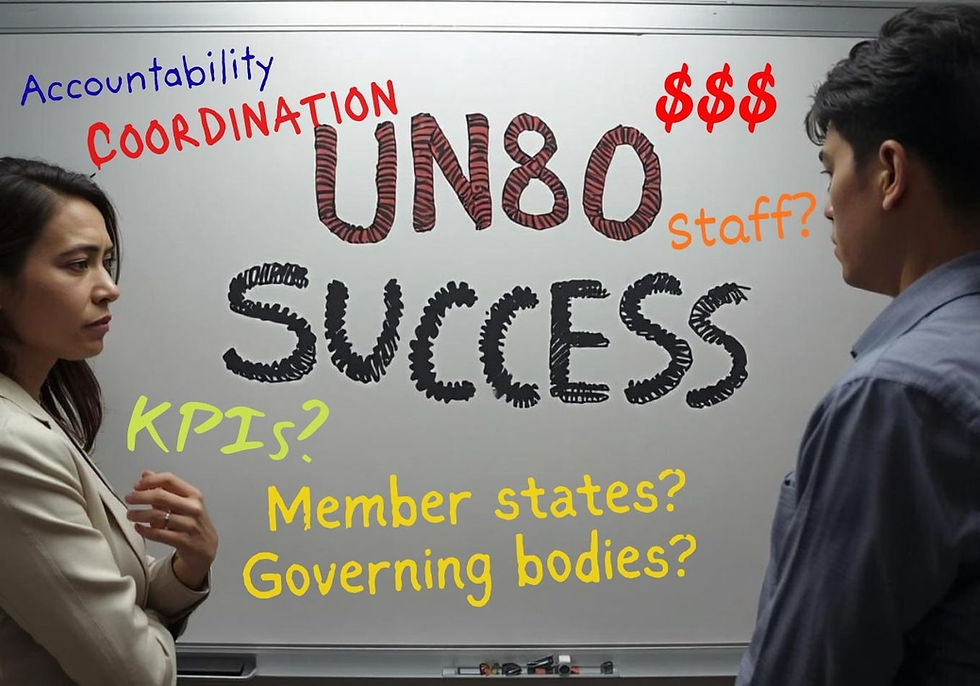Business Transformation at the UN equals Harmonized Processes?
- Katja Hemmerich
- Feb 12, 2023
- 3 min read
Updated: Nov 4, 2024
12 February 2023
By Katja Hemmerich

This week we spotlight “Business Transformation” in the UN in light of the upcoming briefing of UNHCR’s Executive Committee on its Business Transformation Programme on 13 February. UNHCR’s Business Transformation Programme is focused on technological business solutions to support larger transformation processes including decentralization and regionalization, and improved results-based management, people management and digitalization. These transformations are not unique to UNHCR but reflect broader modernization and efficiency efforts across the UN system. One of the tenets of Secretary General Antonio Guterres’ reform agenda was greater efficiency and impact across the UN system. Aside from specific management reforms for the Secretariat, this included the need to simplify and harmonize UN business processes across the UN’s development system. The UN Sustainable Development Group, therefore set up a Business Innovations Strategic Results Group (BIG) to focus on enhancing the efficiency and quality of back office operations to maximize programmatic gains. BIG work streams include:
Mutual recognition of UN entities to enable inter-agency service provision;
Shared client satisfaction principles;
Shared pricing principles for transparency in service provision;
Implementation of a shared Business Operations Strategy for all UN Country Teams (UNCTs);
Common back offices for all UNCTs;
Exploration of shared fleet services and global shared service centers; and,
Increasing the proportion of common UN premises.
Given that the UNHCR Business Transformation Programme includes cloud-based enterprise resource planning systems for human resources, finance and supply chains, Monday’s briefing provides an opportunity to see how they facilitate the harmonization of business processes and what lessons learnt they can provide for other UN entities in terms of simplification of processes and improvement of service quality. The UNICEF Executive Board at its 2022 session learned, for instance, that implementation of the Business Operations Strategy across all UNICEF offices resulted in a $72 million cost avoidance over 5 years. The importance of harmonization of business approaches has also been emphasized recently by the Advisory Committee on Administrative and Budgetary Questions (ACABQ) in two separate reports related to the UN Secretariat’s accountability reforms and UNHCR’s request to adopt separate financial regulations. One of the planned UN Secretariat management reforms is the adoption of Secretariat-wide principles for implementing partners with corresponding standardized processes for their management to be included in Umoja, the enterprise resource planning tool. In its February 2022 report (A/76/728), the ACABQ recommended that the General Assembly “request the Secretary-General, in his capacity as Chair of the Chief Executives Board for Coordination, to develop a harmonized system-wide approach to the management of, and guidelines for, implementing partners”. Similarly, while disagreeing with UNHCR’s request to create standalone Financial Regulations (A/76/635) tailored to UNHCR precisely because of the importance of harmonized financial rules and regulations for transparency, the ACABQ has recognized the need for further review of those rules and regulations. It recommended that the General Assembly request the SG, as Chair of the CEB and with the support of the Director of the United Nations Sustainable Development Group, take a system-wide approach in identifying challenges, and “develop, for the consideration of the Assembly, a proposal for the consolidation and promulgation of financial regulations for the United Nations system, in particular its funds and programmes, and other entities as appropriate” (A/76/729). The General Assembly is still considering both these recommendations and has not made a decision yet. Nevertheless, participants in Monday’s briefing on Business Transformation might want to consider the following questions:
How do the Business Transformation Programme and the Sustainable Development Group’s Business Innovations reinforce and complement each other? Is there any misalignment?
What cost savings or cost avoidance have been demonstrated through the Business Transformation Programme and separately the Business Operations Strategy?
What implication would harmonized UN guidance on implementing partners have on the Business Transformation Programme?
What implications would changes to the UN Financial Regulations have on the Business Transformation Programme?



